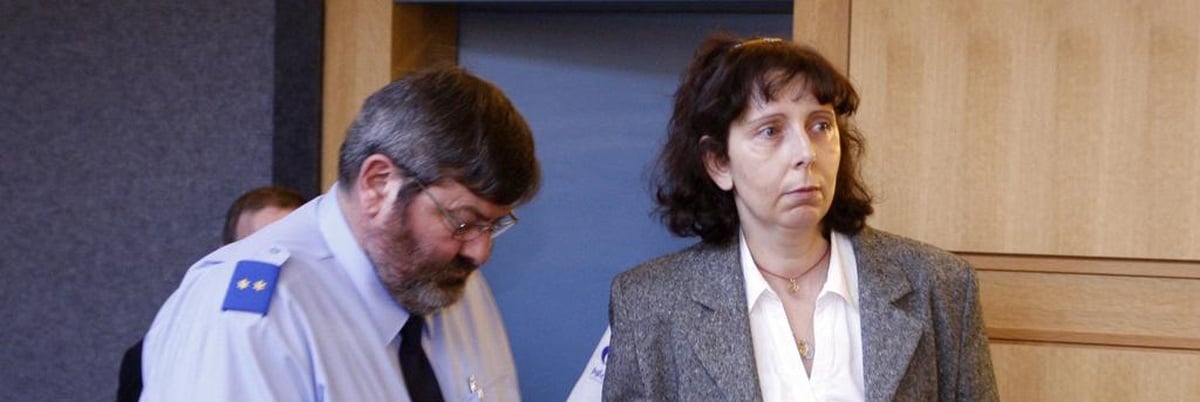Geneviève Lhermitte was killed by lethal injection on Feb. 28 in the hospital in Montigny-le-Tilleul, Belgium. Both "Corriere" and "Repubblica" report the news, drawing a quick portrait of the woman who, in 2007, killed her five children (aged between 3 and 14) and then attempted to commit suicide. Since then, Lhermitte has always lived locked up, first in prison, then in a psychiatric hospital.
What the two main Italian newspapers leave in the background, but which instead can easily be read between the lines in the French-speaking press, is the story of a psychologically fragile woman and a troubled relationship with her husband Bouchaïb Moqadem, a Moroccan with ideas deeply rooted in his culture of origin. Joachim Lafosse's film À Perdre la raison, released in 2013 and loosely based on Lhermitte's story, put the emphasis on the troubled family ménage, albeit through metaphors that are not the easiest to read.
It is clearly difficult to empathize with a mother who almost exterminated her own family. However, the very enormity and absurdity of her insane act impose deep reflection; the more incomprehensible and meaningless an event appears, the more it is indeed necessary to subject it to rational and scrupulous analysis, without indulging in purely emotional reactions.
Belgian law does not provide for the death penalty; however, it does provide that a patient can be euthanized, if desired, if he or she is suffering from "constant, unbearable and ineradicable" physical or psychological suffering.
Lhermitte asked to die, indeed. One wonders, however, how lucid and conscious such a request can be considered when it comes from a woman locked up for years in a psychiatric hospital, with a long history of psychological problems and carrying on her shoulders the pain and guilt of a horrible crime.
Some might think that, lucid or not, Lhermitte ultimately deserved to die. However, if we consider death a reasonable punishment for a multiple murder committed in a moment of darkness by a mentally ill woman who then attempted to commit suicide, how can we tolerate that the perpetrators of the March 2016 Brussels bombing that claimed more than 80 lives - as well as dozens of maimed and permanently disabled people - can instead get away with life in prison?
If we conceive of Lhermitte's euthanasia as a kind of reciprocation for her crimes, such a punishment immediately seems unfair, as it is disproportionate to the punishment inflicted on terrorists guilty of even more serious crimes. If, on the other hand, we view it as a form of respect for the individual's right to self-determination, the contradiction with Lhermitte's troubled psychiatric history, who can hardly be considered capable of making free, conscious and rational decisions, becomes apparent.
How is it possible, then, that in spite of everything the medical committee appointed to review the woman's petition gave the go-ahead for euthanasia?
I fear that the answer must be sought in the continuing cuts that are effectively dismantling the welfare system in most European countries. From a supposed "painful necessity," the policy of cuts has now become an ideological choice, openly claimed in the name of supposed "efficiency" and the now mythological "competitiveness of the country system."
The consequences emerged in the most tragic way with the pandemic, which highlighted all the limitations of European health care systems and the Italian one in particular. However, even today, in almost all of Europe, policy is pushing solely on vaccines, rather than investing in hospitals and community medicine. The message is very clear: universal health care costs too much, so it is up to the citizen to do everything not to burden the system.
Little does it matter if the population is increasing in numbers - mostly due to immigration - and if the average age is rising steadily, there will always be fewer beds, as European states feel they need to focus their spending on other fronts (today particularly on sending weapons to Ukraine, but in fact something is always found as a priority over health care or schools).
Within this framework, it seems clear that chronic patients like Lhermitte, in need of lifelong care and surveillance, represent a cost that the state (Belgium, in this case) no longer wants to bear: therefore, why not offer them "sweet death" and take away a nuisance but, more importantly, eliminate a cost center?
So much for the right to life enshrined in Article 2 of the Charter of Fundamental Rights of the European Union. It's the market, gorgeous!
Research Fellow at the Machiavelli Center for Political and Strategic Studies, formerly worked as a consultant at European Parliament, Presidency of the Council of Ministers, Chamber of Deputies and Ministry of Economic Development. M.A. in Philosophy at the Catholic University of Milan.









Scrivi un commento